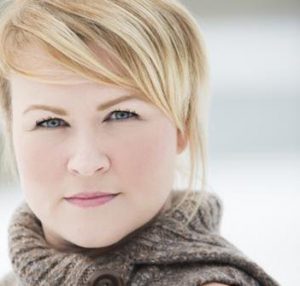 For #PlaySmelter 2017, we’re interviewing some of the great actors, writers, designers, producers, and key creatives involved in building our annual festival of new work.
For #PlaySmelter 2017, we’re interviewing some of the great actors, writers, designers, producers, and key creatives involved in building our annual festival of new work.
Sarah Gartshore is an emerging playwright from St. Joseph Island who lives in Sudbury. Her play, Debwewin (Truth), will be read at this year’s #PlaySmelter Festival.
Sarah’s intention, as a playwright, is to offer a platform for voices from the margins. Her play Survivance has received dramaturgical support, a workshop and reading with Pat The Dog Theatre Creation. Survivance will be work-shopped in Stratford with Muriel Miguel, renowned playwright, director and founder of Spider Woman Theatre in New York. Survivance was performed during Shkagamik-Kwe’s National Aboriginal Day celebration at Sudbury Theatre Centre and an excerpt was performed at Native Earth Performing Arts in Toronto during their Weesageechak Begins To Dance Festival, as part of it’s Animikiig Creators offering. Sarah is currently writing ArmHer, a CCA funded, multi-year collaboration with Myths and Mirrors and community members with lived experience in sex work. Sarah is also developing POW!, a play for and about Aboriginal youth, funded by OAC’s Theatre Creators Reserve.
1. Part of the pain experienced by survivors of the residential schools was not being believed. Even after the Commission, there have been accounts of deniers and apologists, most recently the controversy over Senator Lynn Beyak’s comments. Your piece seems to gesture to large and important questions that hovered over the Commission, like whose truth counts and how is it disclosed; even the title, Debwewin (‘truth’ in Ojibwe) suggests that there is always some kind of translation involved in acts of truth-telling or bearing witness. Can you say more about this?
Well, to be honest, I added the ‘truth’ part so people who don’t know what Debwewin means would have some understanding. Debwewin is one of our Seven Grandfather Teachings and so I don’t take that title lightly. I’m learning Ojibway and to hear that word, Debwewin, in the mouths of treaty people (which is all of us) makes my heart happy. The title of my play comes from the whole concept of truth and reconciliation. I feel like many people want to rush to reconciliation and feel that they are ready for that when the reality is that we are just beginning to hear and understand the truth of what happened on Turtle Island over the last one hundred and fifty years. All one has to do is read the comments on a post about anything to do with Indigenous people standing up for themselves and you’ll see we are very much at the beginning… nowhere near reconciliation.
2. You speak of a rising collective Indigenous voice across Canada, but I’m interested to hear your thoughts on how it’s emerging in Sudbury/northern Ontario, particularly in the arts.
I think that it’s hip to be Indigenous right now (at least it’s profitable) unless you’re actually Indigenous, so we’re seeing a lot of push to get our work out there. It’s something that us in the arts are trying to navigate… when you’re just happy to get work, it’s hard to say no, so we’re having to do a lot of supporting of one another and questioning the intention behind the organizations who have taken a sudden interest in our work. I can speak to what’s happening in Sudbury and with my work in particular. Pat The Dog has supported and promoted my work since before they realized I was Indigenous and I am beyond grateful to Lisa and Matt. Quite simply, I wouldn’t be a playwright without them. I’m fortunate that I have built relationships over the years in the Sudbury arts community with artists who are wonderful to work with, whether it’s acting, directing, photography, film, tech… the Sudbury arts community is a wildly talented, supportive bunch of people.
3. Does your writing integrate Indigenous storytelling practices? Having worked with playwright development centres like Pat the Dog, have you ever found such practices at odds with standard dramaturgical models (e.g., action-driven, linear narrative, the two-act play, etc.)?
My work is at odds with every standard model of playwriting. The style that I write in is very much about story telling and heavy with individual monologues. Anishinaabe are Story Tellers and so I think the way I write comes from my family and the way my Grandfather would tell us stories. I’m very fortunate that neither Matt or Lisa tried to change the way I told a story. They never said ‘a little heavy on the monologues Gartshore’ even though everyone else did! And since they were central to me feeling like I was a playwright and were there to nudge me along, if they had said that, I think it would have been devastating. I feel like I am a baby story teller largely because I still have to write my stories down. I feel that I am too attached to grammar, sentence structure etc (although I do play a lot with it and try to shake it up) and will feel like a bonafide Story Teller when I am able to remember and tell the stories and not depend on my computer.
To see a full #PlaySmelter festival schedule and to purchase tickets, click the button below!
[button size=’medium’ style=’white’ text=’TICKETS’ icon=” icon_color=” link=’https://www.eventbrite.ca/e/playsmelter-2017-tickets-33467899388′ target=’_blank’ color=’#FFF’ hover_color=” border_color=” hover_border_color=” background_color=’#000′ hover_background_color=” font_style=’normal’ font_weight=’800′ text_align=’center’ margin=”]